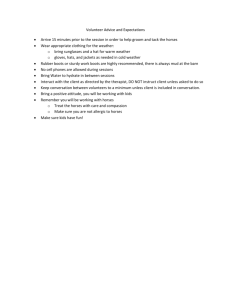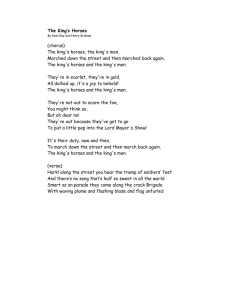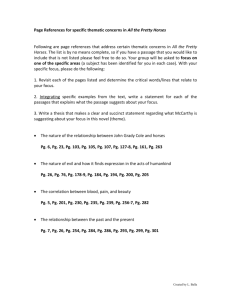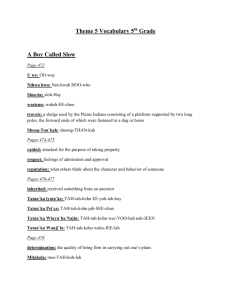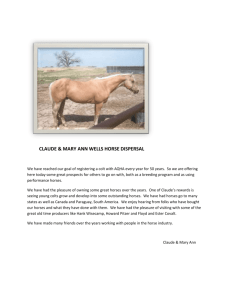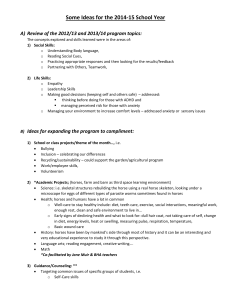File
advertisement
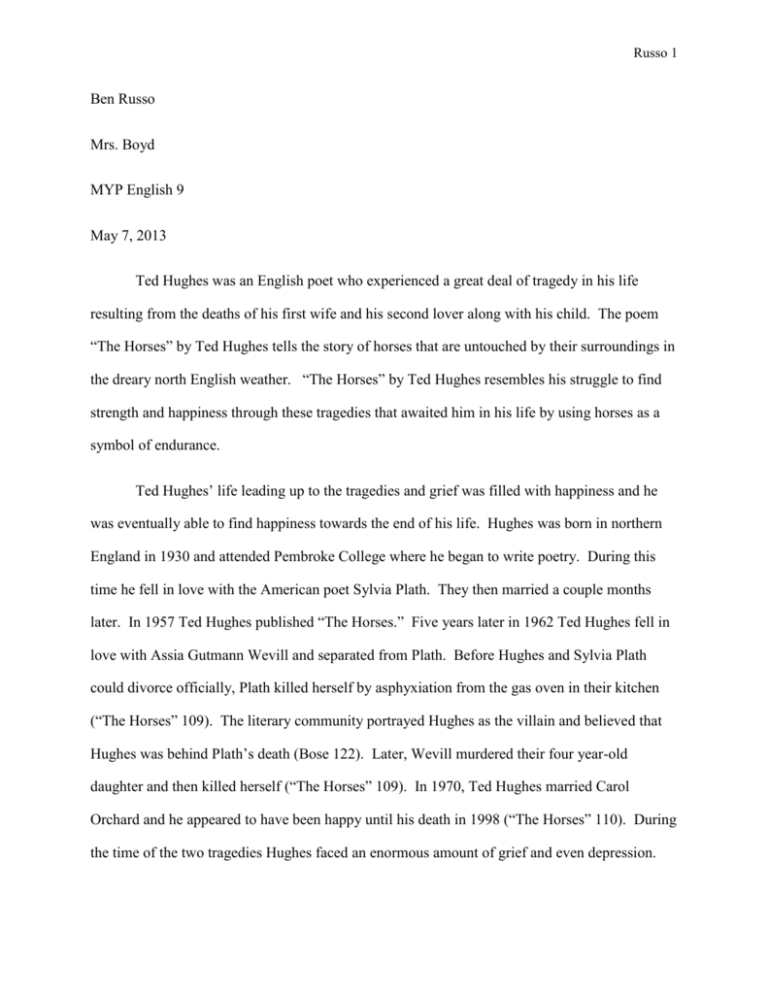
Russo 1 Ben Russo Mrs. Boyd MYP English 9 May 7, 2013 Ted Hughes was an English poet who experienced a great deal of tragedy in his life resulting from the deaths of his first wife and his second lover along with his child. The poem “The Horses” by Ted Hughes tells the story of horses that are untouched by their surroundings in the dreary north English weather. “The Horses” by Ted Hughes resembles his struggle to find strength and happiness through these tragedies that awaited him in his life by using horses as a symbol of endurance. Ted Hughes’ life leading up to the tragedies and grief was filled with happiness and he was eventually able to find happiness towards the end of his life. Hughes was born in northern England in 1930 and attended Pembroke College where he began to write poetry. During this time he fell in love with the American poet Sylvia Plath. They then married a couple months later. In 1957 Ted Hughes published “The Horses.” Five years later in 1962 Ted Hughes fell in love with Assia Gutmann Wevill and separated from Plath. Before Hughes and Sylvia Plath could divorce officially, Plath killed herself by asphyxiation from the gas oven in their kitchen (“The Horses” 109). The literary community portrayed Hughes as the villain and believed that Hughes was behind Plath’s death (Bose 122). Later, Wevill murdered their four year-old daughter and then killed herself (“The Horses” 109). In 1970, Ted Hughes married Carol Orchard and he appeared to have been happy until his death in 1998 (“The Horses” 110). During the time of the two tragedies Hughes faced an enormous amount of grief and even depression. Russo 2 This grief and sadness was accompanied by the blame placed on him from the literary world, until he eventually found happiness from his third marriage. Criticism of “The Horses” notes the sensuous appeal and imagery of this free verse poem, but also the wisdom that Hughes puts forward through the symbolic horses. Critic Sheri Metzger Karmiol states that “Even the positioning of the horse’s mane invites the reader’s touch” (Karmiol 118). Karmiol goes on to say that “They do not move; they only endure” and “He envies their strength, endurance, and ability to patiently wait for whatever is to come” (Karmiol 119). Karmiol recognizes that the horses symbolize finding strength through enduring one’s environment. Sudip Bose draws on the more literal nature of the poem remarking “as the west Yorkshire hillsides of his boyhood, an unforgiving landscape of immensity and grandeur - in order to render a complex inner world” (Bose 122). These critics recognize the imagery of Hughes’ “The Horses,” but also bring to the surface the deeper meaning of strength, which the horses symbolize. “The Horses” by Ted Hughes fills the reader’s mind with imagery, which allows him or her to understand the symbolism of the horses in the poem. Hughes sets the tone of this free verse poem by creating a clear image of the setting and the horses through the use of imagery. The reader can picture the horses’ stone manes and “world cast in frost” (Hughes 4). This sensuous image enables the reader to capture the message of the poem, that is in order to have strength one must endure his or her surroundings. The theme of this poem is captured in the final line “Hearing the horizons endure” (Hughes 37). Ted Hughes’ “The Horses” enables the reader to better understand the symbolism of the horses by the vivid and sensuous imagery that is deployed. The horses that endure the early morning in the countryside foreshadow the strength that Hughes needed in his later struggle through multiple tragedies. Since the poem was written Russo 3 before the tragedies unfolded, the feelings Hughes adds to the poem cannot be related to what he faced in his later life. The message of the poem is still relevant to Hughes’ life. “They do not move; they only endure. The narrator watches the horses with what can only be called envy” (Karmiol 119). This outlines Hughes’ internal struggle during the death of Plath and Wevill, as well as their daughter. Hughes was quiet during the deaths of Plath, Wevill, and his daughter. He withstood the attention put on him from the literary community. Although the tragedies had no effect on the poem due to the chronological order of events, they are still connected in this way. It is almost ironic how Hughes was unaware of the relation between of the poem to strength he would need through the events that were yet to come. “The Horses” resemble the struggle Ted Hughes faced following the death of Plath, Wevill, and his daughter, even though they are in no way related. “The Horses” brings across a message of endurance and strength, which was needed by the author, Ted Hughes to face the tragedies later in his life after the creation of this poem. Through the death of his wife, Sylvia Plath and his mistress, Assia Wevill, as well as his daughter, Hughes endured criticism and attention placed on him until he was finally able to find happiness. The symbol of the horses in “The Horses” by Ted Hughes resemble his journey to find strength like the horses through the tragedies that unfolded in the years to come. Works Cited Russo 4 Bose, Sudip. “The Horses.” Poetry for Students. Ed. Sara Constantakis. Vol. 32. Detroit: Gale, 2010. 121-123. Print. “The Horses.” Poetry for Students. Ed. Sara Constantakis. Vol. 32. Detroit: Gale, 2010. 108-118. Print. Karmiol, Sheri Metzger. “The Horses.” Poetry for Students Ed. Sara Constantakis. Vol. 32. Detroit: Gale, 2010. 118-121. Print “Ted Hughes, The Horses.” Poems. N.p., n.d. Web. 7 May 2013. Ted Hughes, “The Horses” Russo 5 I climbed through woods in the hour-before-dawn dark. Evil air, a frost-making stillness, Not a leaf, not a bird A world cast in frost. I came out above the wood Where my breath left tortuous statues in the iron light. But the valleys were draining the darkness Till the moorline - blackening dregs of the brightening grey Halved the sky ahead. And I saw the horses: Huge in the dense grey - ten together Megalith-still. They breathed, making no move, with draped manes and tilted hind-hooves, Making no sound. I passed: not one snorted or jerked its head. Grey silent fragments Of a grey silent world. I listened in emptiness on the moor-ridge. The curlew's tear turned its edge on the silence. Slowly detail leafed from the darkness. Then the sun Orange, red, red erupted Silently, and splitting to its core tore and flung cloud, Shook the gulf open, showed blue, And the big planets hanging I turned Stumbling in the fever of a dream, down towards The dark woods, from the kindling tops, And came to the horses. There, still they stood, But now steaming and glistening under the flow of light, Their draped stone manes, their tilted hind-hooves Stirring under a thaw while all around them Russo 6 The frost showed its fires. But still they made no sound. Not one snorted or stamped, Their hung heads patient as the horizons, High over valleys in the red levelling rays In din of crowded streets, going among the years, the faces, May I still meet my memory in so lonely a place Between the streams and the red clouds, hearing the curlews, Hearing the horizons endure.
